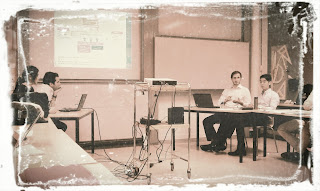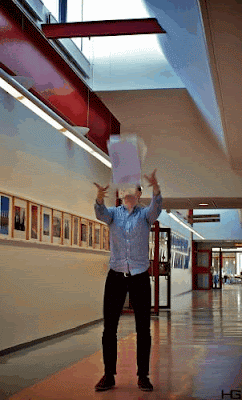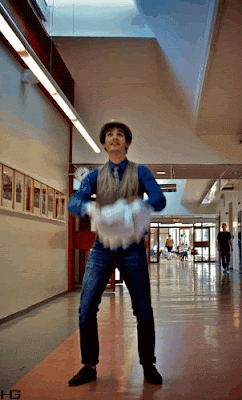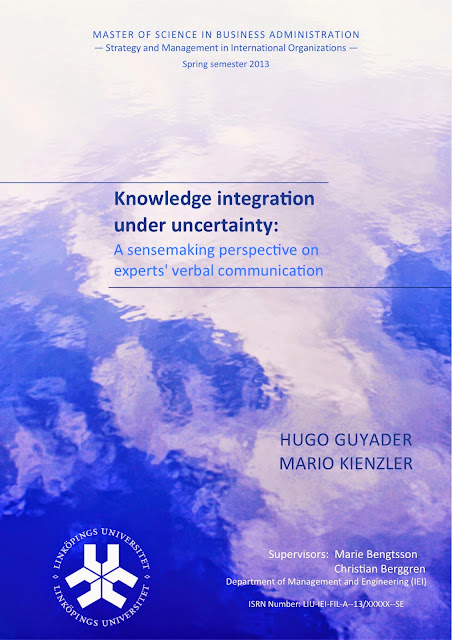A lot happened during the last 2-3 weeks. Long story short: I graduated, I visited Stockholm and its archipelago and I celebrated Midsummer. That's how this long article is divided :)
The World is a book, and those who do not travel read only one page. - Saint Augustin
Tuesday, June 25, 2013
Tuesday, June 4, 2013
Master Thesis (6)
Thesis Defense
After several months of hard work on the Master Thesis, the final seminar represents the last step of the semester, and thus, of these 2 years within the SMIO program. As discussants, the aim of the final seminar is to critically scrutinize a thesis and bring out both strengths and weaknesses through dialogue a dialogue with its authors. The authors should have the opportunity to shine and show off their great knowledge by answering both intelligent and tricky questions.
A usual thesis is 70 to 100 page-long, which gives enough room for questions and comments from the opponents to the authors.
The final seminar was structured as the following:
- The authors have 2 min. to point out critical mistakes they have discovered after printing the thesis (as forgetting a 'not' in a sentence which completely changes the message).
- The opponents hold a 10 min. presentation of the authors' thesis. As the audience is supposed to have read the thesis as well, it is basically a concise summary to show how it has been understood. It is customary to ask the authors if the presentation did their work justice or if they would like to add something (approx. 2 min.).
- Then, the discussion/defense begins and lasts 45 min. The discussants lead the seminar, ask questions (big and important issues, first; small details come if there is time left), initiate discussions, point-out strengths and weaknesses in the thesis, and invite comments from the audience. The authors should answer the questions, explain their reasoning, and show extensive understanding. The discussants normally end their section by giving some sort of judgment of the qualities of the author's thesis.
- The advisor and co-examiner have the word for 15 min. to give an overall judgment of the thesis as well as the defense and they can ask some final questions if needed.
- The opponents give to the authors a 5 pages-long hand-out with all their comments and questions. Additionally, the opponents can also provide the authors with the annotated manuscript if desired.
- Once all the defenses are held (over two and a half days), all advisors will convene and discuss the quality of the theses and decide upon the final grades.
This 1h15 final seminar is the place to shine for the authors. It is a final test of explanation. Discussions can even go beyond the thesis' borders. Although some of the groups exchanged their questions beforehand, including the audience in the discussion bring criticism and make the discussions more alive.
I personally enjoyed defending my thesis. Mario and I had the chance to show our understanding of the concepts we used, the reasons behind it and to open-up for further research as well as implications for the existing theories. We received really good feedback from the supervisor Marie Bengtsson and co-examiner Jonas Söderlund, thus we are expecting a decent grade reflecting their opinions :)
IT'S OVER.
Overall, this Master Thesis was a good experience. Quite stressful when nothing work out as planned, of course, but it helped us to understand the situation that expert engineers encounter in their daily project work! I very much enjoyed the process of research and discovery. I learned a lot during these four months, included myself. I am also very grateful to Mario, he is a dedicated hard worker with the ability to combine different abstract concepts and think them through. It was definitely a good partnership and I sincerely hope that we have more opportunities to work together in the future.
Sunday, June 2, 2013
Master Thesis (5)
Week end? What's that!?
The last 3 weeks have been insane. Every damn day was spent in a library room (think: cold and without window) to significantly boost our thesis from the feedback received during the Pre-Final seminar. Now, we submitted our final version a few days ago and we are satisfied with it! You cannot imagine the mix feelings of proudness and relieve when we eventually have the printed version in hands.
Giving birth after 4 months of hard labor, it's called: Knowledge Integration under Uncertainty.
Our study takes a sensemaking perspective on how do expert engineers communicate within a New Product Development (NPD) project team when they integrate their individual knowledge and overcome the environmental uncertainty—which should paralyze the team instead.
Through the belief-driven process of Karl Weick's sensemaking concept, we analyze the verbal communication during a meeting of experts from a NPD project aiming to design a new steam turbine.
The meeting's structure was the following: informing each other, discussing and planning. Taking a deeper look at how do the experts discuss, we identify punctuated forms of expectations and frequent arguments.
Eventually, arguing itself is characterized by elements of questioning, rewording and summarizing. Hence, we see arguing as a facilitator of knowledge integration under uncertainty.
What's next?
The next step is the thesis defense, publicly taking place on June 3rd-5th at Linköping University (1h15 for each thesis). Next to their own defense, each pair of authors is required to make an opposition on one other thesis and actively participate in four other thesis defenses.
Afterwards (and only then), we all will be able to enjoy the great spring weather in Linköping!
Subscribe to:
Comments (Atom)



.gif)

.jpg)
